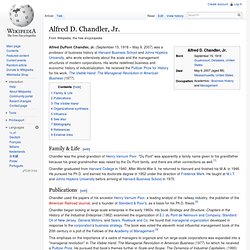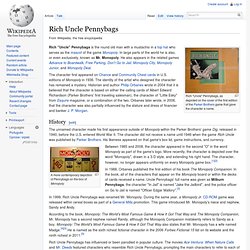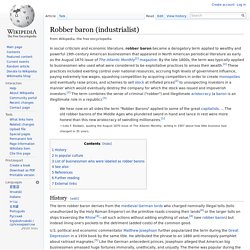

Alfred D. Chandler, Jr. Alfred DuPont Chandler, Jr.

(September 15, 1918 – May 9, 2007) was a professor of business history at Harvard Business School and Johns Hopkins University, who wrote extensively about the scale and the management structures of modern corporations. His works redefined business and economic history of industrialization. He received the Pulitzer Prize for History for his work, The Visible Hand: The Managerial Revolution in American Business (1977). Family & Life[edit] Chandler was the great-grandson of Henry Varnum Poor. Rich Uncle Pennybags.
Rich "Uncle" Pennybags, as depicted on the cover of the first edition of the Parker Brothers game that gave the character a name.

History[edit] The unnamed character made his first appearance outside of Monopoly within the Parker Brothers' game Dig, released in 1940, before the U.S. entered World War II. The character did not receive a name until 1946 when the game Rich Uncle was published by Parker Brothers. Robber baron (industrialist) In social criticism and economic literature, robber baron became a derogatory term applied to wealthy and powerful 19th-century American businessmen that appeared in North American periodical literature as early as the August 1870 issue of The Atlantic Monthly[1] magazine.

By the late 1800s, the term was typically applied to businessmen who used what were considered to be exploitative practices to amass their wealth.[2] These practices included exerting control over national resources, accruing high levels of government influence, paying extremely low wages, squashing competition by acquiring competitors in order to create monopolies and eventually raise prices, and schemes to sell stock at inflated prices[2] to unsuspecting investors in a manner which would eventually destroy the company for which the stock was issued and impoverish investors.[2] The term combines the sense of criminal ("robber") and illegitimate aristocracy (a baron is an illegitimate role in a republic).[3]